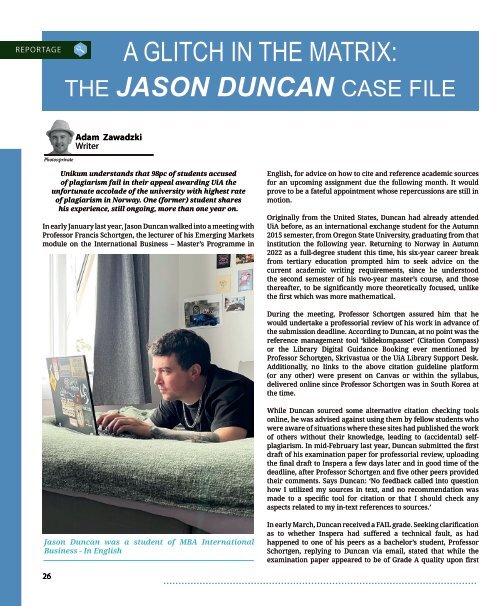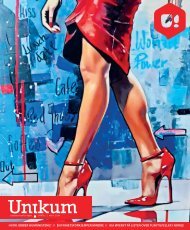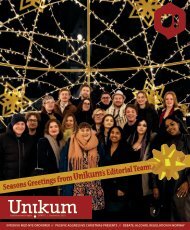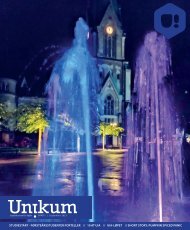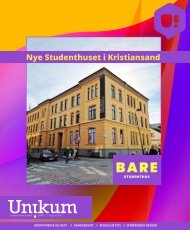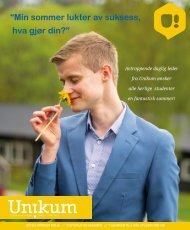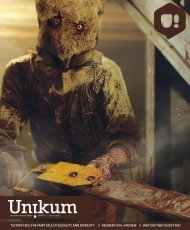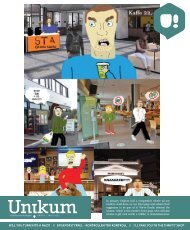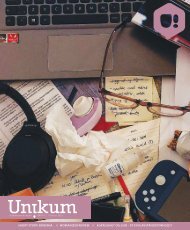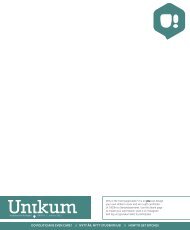FEBRUARY24_UNIKUM_WEB
Create successful ePaper yourself
Turn your PDF publications into a flip-book with our unique Google optimized e-Paper software.
REPORTAGE<br />
A GLITCH IN THE MATRIX:<br />
THE JASON DUNCAN CASE FILE<br />
Photos:private<br />
Adam Zawadzki<br />
Writer<br />
Unikum understands that 98pc of students accused<br />
of plagiarism fail in their appeal awarding UiA the<br />
unfortunate accolade of the university with highest rate<br />
of plagiarism in Norway. One (former) student shares<br />
his experience, still ongoing, more than one year on.<br />
In early January last year, Jason Duncan walked into a meeting with<br />
Professor Francis Schortgen, the lecturer of his Emerging Markets<br />
module on the International Business – Master’s Programme in<br />
English, for advice on how to cite and reference academic sources<br />
for an upcoming assignment due the following month. It would<br />
prove to be a fateful appointment whose repercussions are still in<br />
motion.<br />
Originally from the United States, Duncan had already attended<br />
UiA before, as an international exchange student for the Autumn<br />
2015 semester, from Oregon State University, graduating from that<br />
institution the following year. Returning to Norway in Autumn<br />
2022 as a full-degree student this time, his six-year career break<br />
from tertiary education prompted him to seek advice on the<br />
current academic writing requirements, since he understood<br />
the second semester of his two-year master’s course, and those<br />
thereafter, to be significantly more theoretically focused, unlike<br />
the first which was more mathematical.<br />
During the meeting, Professor Schortgen assured him that he<br />
would undertake a professorial review of his work in advance of<br />
the submission deadline. According to Duncan, at no point was the<br />
reference management tool ‘kildekompasset’ (Citation Compass)<br />
or the Library Digital Guidance Booking ever mentioned by<br />
Professor Schortgen, Skrivastua or the UiA Library Support Desk.<br />
Additionally, no links to the above citation guideline platform<br />
(or any other) were present on Canvas or within the syllabus,<br />
delivered online since Professor Schortgen was in South Korea at<br />
the time.<br />
While Duncan sourced some alternative citation checking tools<br />
online, he was advised against using them by fellow students who<br />
were aware of situations where these sites had published the work<br />
of others without their knowledge, leading to (accidental) selfplagiarism.<br />
In mid-February last year, Duncan submitted the first<br />
draft of his examination paper for professorial review, uploading<br />
the final draft to Inspera a few days later and in good time of the<br />
deadline, after Professor Schortgen and five other peers provided<br />
their comments. Says Duncan: ‘No feedback called into question<br />
how I utilized my sources in text, and no recommendation was<br />
made to a specific tool for citation or that I should check any<br />
aspects related to my in-text references to sources.’<br />
Jason Duncan was a student of MBA International<br />
Business - In English<br />
In early March, Duncan received a FAIL grade. Seeking clarification<br />
as to whether Inspera had suffered a technical fault, as had<br />
happened to one of his peers as a bachelor’s student, Professor<br />
Schortgen, replying to Duncan via email, stated that while the<br />
examination paper appeared to be of Grade A quality upon first<br />
26


